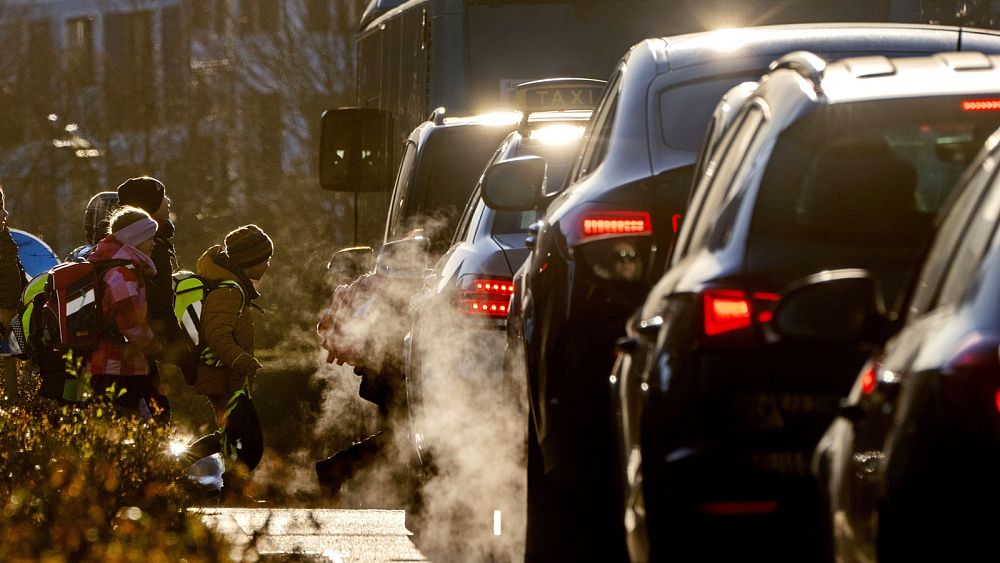
Brussels is abuzz with talks and takes on e-fuels, a nascent technology that combines hydrogen and CO2 to produce alternative sources to power road vehicles.
The esoteric topic suddenly finds itself at top of the European Union’s political agenda after a small group of member states, including Germany and Italy, pushed last week to delay the final vote on the phase-out of combustion engine cars.
The phase-out had already been agreed upon by the co-legislators, the EU Council and the European Parliament, with a cut-off date of 2035, the deadline by which all new cars and vans sold across the bloc should present a 100% reduction in CO2 emissions.
Brussels chose 2035 as the time limit because the average lifespan of vehicles is 15 years and the European Green Deal aims to make the entire economy climate neutral by 2050.
In practice, the measure means the end of the combustion engine as we know it, a major shift with vast implications for Europe’s automotive industry and the 13 million jobs that directly and indirectly depend on the sector.
The German Ministry of Transport, led by the business-friendly FDP party, has mounted a campaign to spare e-fuels in a bid to keep the combustion engine alive after 2035. The ministry says the European Commission, which drafted the original legislation, had offered a verbal commitment during negotiations to table a separate proposal that would enshrine the e-fuel exemption in law.
“How the Commission intends to fulfill its promise is of secondary importance. We are not imposing any conditions on the Commission in this regard,” a spokesperson from the ministry told Euronews.
“What is important is that the Commission quickly submits legally binding and legally effective proposals to enable vehicles that can demonstrably be fuelled only with e-fuels to still be registered after 2035. This was the explicit pre-condition for Germany to agree to the revision of the CO2 Regulation.”
The European Commission declined to comment on any verbal commitment or the possibility of designing a brand-new piece of legislation to satisfy Berlin’s demands but said it was working “constructively” with member states to push the law over the finish line.
“The proposed legislation is technologically neutral,” a Commission spokesperson said.
What exactly are e-fuels?
The production of e-fuels, also known as synthetic fuels or electro-fuels, starts with the process of electrolysis, which splits water (H2O) into hydrogen (H) and oxygen (O). The hydrogen is then mixed with carbon dioxide (CO2) to create the e-fuel in liquid form.
This e-fuel is later refined into e-petrol, e-diesel, e-kerosene and e-methanol, among other derivatives, that have commercial purposes similar to those of the fossil fuels they seek to replace.
In the case of vehicles, e-fuels can be blended in with oil-based fuels and combusted in the same engine, which means a smaller but still considerable amount of pollutants are released into the air.
Germany argues these damaging emissions can be offset by decarbonising the entire manufacturing process. This would entail mixing fully green hydrogen with carbon dioxide directly captured from the air, as well as using 100% renewable electricity across the value chain.
“Provided they are produced with renewable energy, e-fuels are climate neutral,” the German spokesperson said.
The current state of the market, however, suggests the goal faces an uphill struggle: over 96% of the hydrogen currently produced in Europe comes from natural gas, while carbon capture technology continues to fall short of expectations, despite decades of development.
These tight conditions put pressure on prices and supplies, relegating e-fuels to a niche, well-off audience and overshadowing one of their key assets: e-fuels can be stored and shipped at room temperature worldwide, contrary to electricity, which is generated for immediate, near-at-hand consumption.
The eFuel Alliance, a Berlin-based interest group, blames the adverse situation on the lack of political endorsement for e-fuels, which hampers the development of a genuine economy of scale.
“European production capacities are very limited,” the Alliance told Euronews in a statement. “But scaling up is waiting in the wings. However, this is not due to a lack of demand, but to uncertainties of the political framework conditions at the EU level.”
The Alliance complains the EU’s combustion engine ban is based on CO2 emissions detected at the exhaust pipeline, a condition that rules e-fuels out, rather than on the carbon footprint of the manufacturing process.
“This means that only vehicles that do not emit any emissions in real-life operation are classified as climate-neutral,” the Alliance said. “This is one of the biggest problems and counteracts the actual efforts to advance any technology that is useful for the climate.”
Expressing similar views, Verband der Automobilindustrie (VDA), the association that represents the German automotive industry, says the EU should offer tax advantages to incentivise the uptake of “climate-neutral fuels” – even if e-fuels hardly classify as such at the moment.
“The market ramp-up of e-fuels technology must no longer be slowed down politically,” a VDA spokesperson told Euronews.
Low-carbon vs Low-cost
E-fuels are further beset by criticism for their poor energy inefficiency compared to their greatest rival in green transport: electric vehicles.
The International Council on Clean Transportation (ICCT), an independent research organisation based in Washington, has estimated that, on average, 48% of renewable electricity used to convert e-fuels into liquid is lost along the process, while up to 70% of the fuel’s energy is lost upon combustion.
This leads to a 16% efficiency.
By contrast, in electric vehicles, the ICCT says, only 10% of electricity is lost in charging and 20% is lost by the motor, resulting in a 72% efficiency.
Transport & Environment (T&E), a Brussels-based NGO that advocates for cleaner transport, projected very similar efficiency numbers in a critical report published last October.
The study showed that, due to the disparate efficiency rates, an electric car could travel five to six times farther than its e-petrol counterpart using the same amount of renewable electricity.
“It is incredibly energy inefficient to create any synthetic fuel,” said Alex Keynes, clean vehicles manager at Transport & Environment. “E-fuels should not have a place in decarbonising cars. It is simply a waste of investment, a waste of energy and is not a credible technology.”

Keynes believes e-fuels should be promoted in economic sectors that currently lack low-carbon solutions, like maritime transport and aviation, rather than in the automotive industry where a “cheaper and viable alternative” exists in the form of electric vehicles.
Asked about Germany’s position, Keynes said a tailor-made exemption for e-fuels would open up loopholes and be “simply unenforceable.”
“There is no way to control whether the driver of the vehicle is putting fossil petrol or e-petrol into the car,” Keynes told Euronews in an interview. “This creates a significant risk of greenwashing.”
The industry insists Europe’s road to climate neutrality should be “technology open” and embrace nascent technology, even if their commercial potential and environmental prowess are yet to be proven.
“At the beginning of every transformation, there are many question marks and uncertainties,” said the eFuel Alliance. “Radical changes require trust and courage.”
The Alliance admits the efficiency of e-fuels is “still being debated” but has a notable recommendation to close the gap with electric vehicles: to set up production centres in countries with “ideal conditions for solar and wind power,” such as those in Africa, the Middle East and South America.
Civil society adamantly opposes this strategy, arguing that in the context of the climate crisis and Russia’s war in Ukraine, the last thing Europe needs is yet another dependency on imported fuel.
“The 2035 phase-out of internal combustion engines is the best way forward,” Keynes said. “If this target is watered down, then Europe simply cannot even comply with its own Paris Agreement commitments.”









Leave a Reply